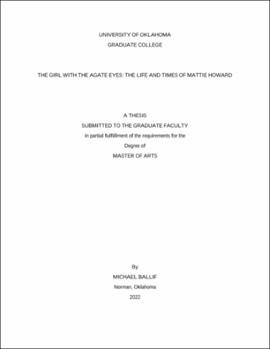| dc.description.abstract | This thesis studies the life of Martha Alice “Mattie” Howard, a forgotten figure in both the early 20th-century criminal underworld and the evangelical circuit of 1930s and 1940s America. Straddling the line between social deviant and moral exemplar, Mattie’s story is one of constant reinvention and narrative building. When she was accused of murder in Kansas City, Missouri, the local and, eventually, national press painted her as a nearly supernatural force for evil. Nearly twenty years later, Mattie published an autobiography in which she directly attacked the narratives of the newspapers and sought to portray herself as an inherently moral and good woman who had been falsely persecuted. Coupling this narrative shift alongside her conversion to evangelical Christianity and new career as a traveling minister, her reinvention as a woman of God was taken at face value and the direr accusations against her were conveniently forgotten. A study of Mattie’s life sheds light on several different types of history, from gender to criminal to religious, and provides a unique portrait of a woman who appeared on both sides of the respectability divide | en_US |
